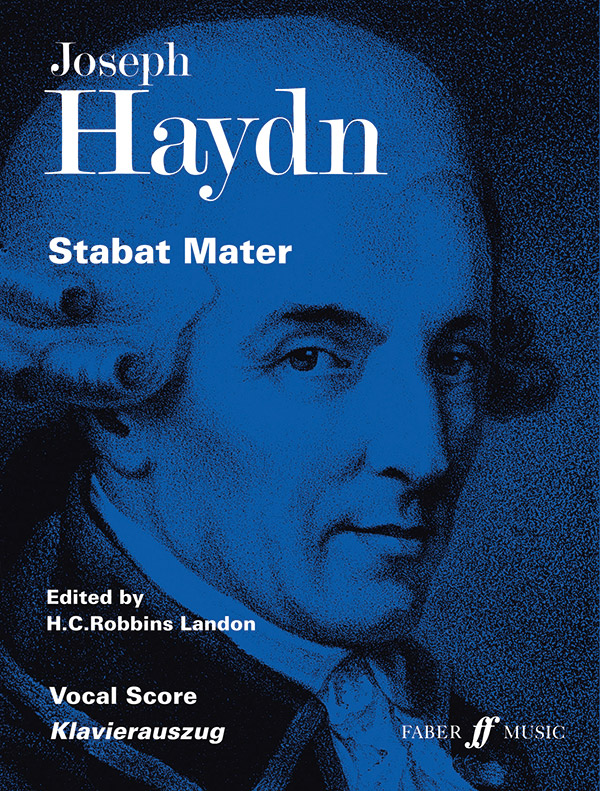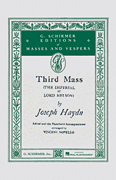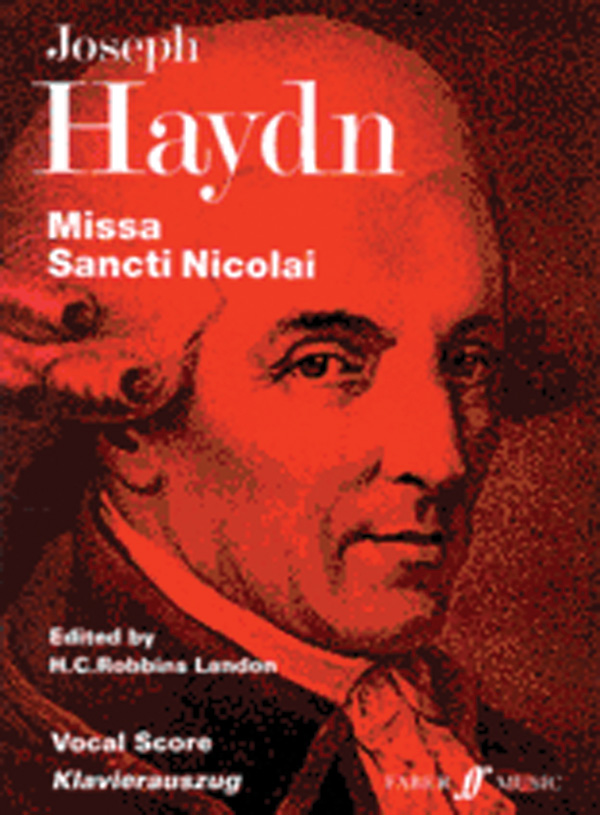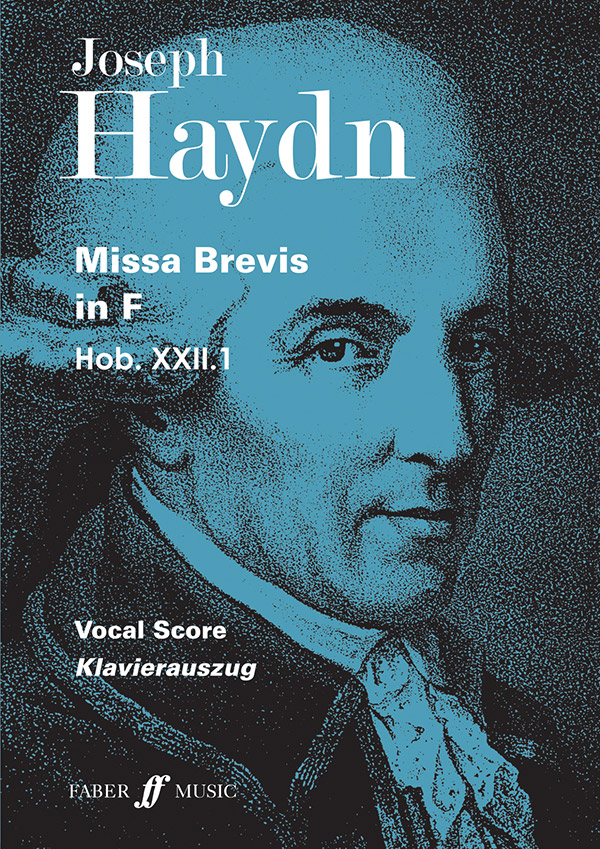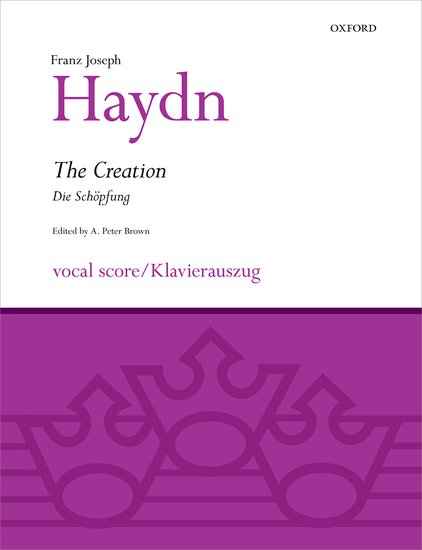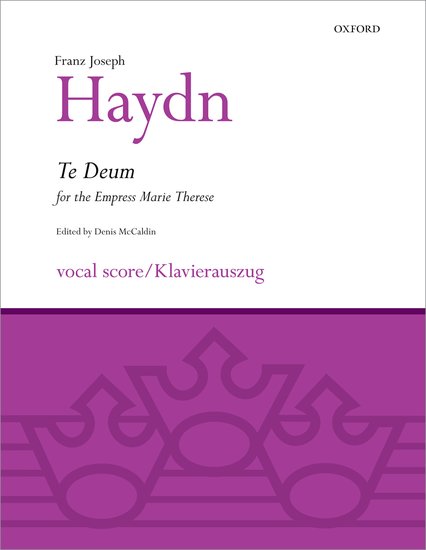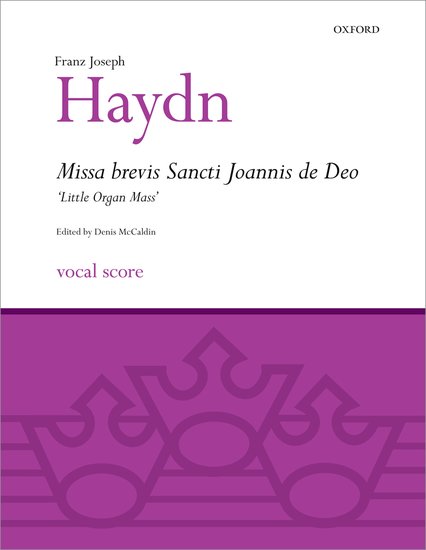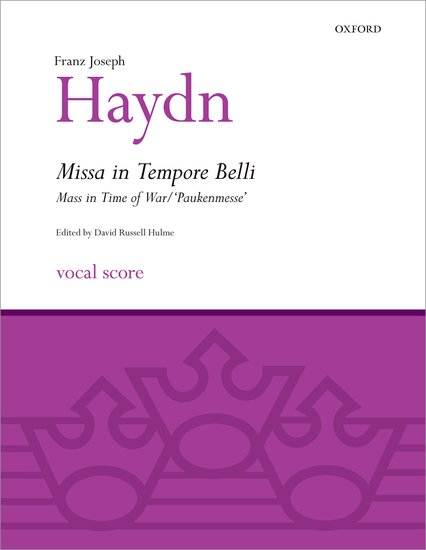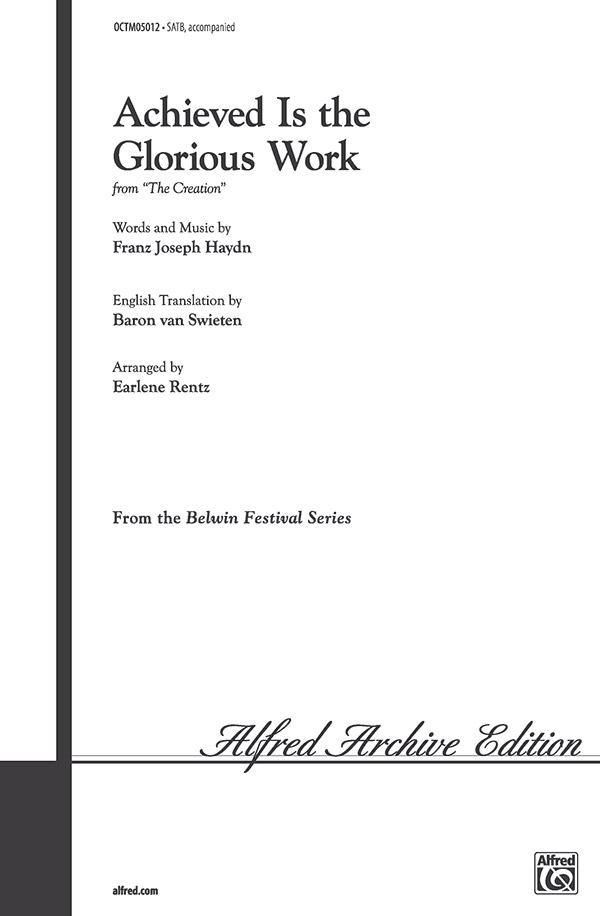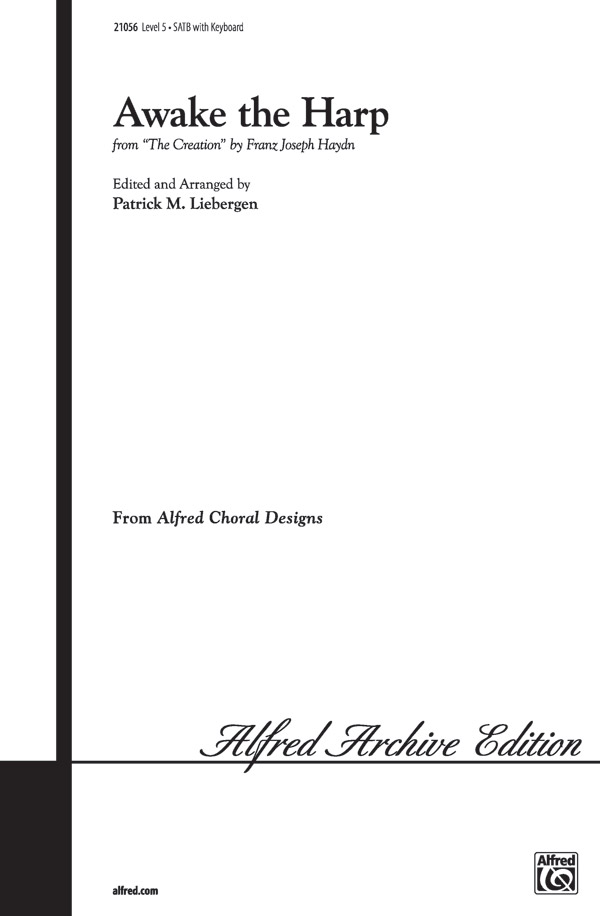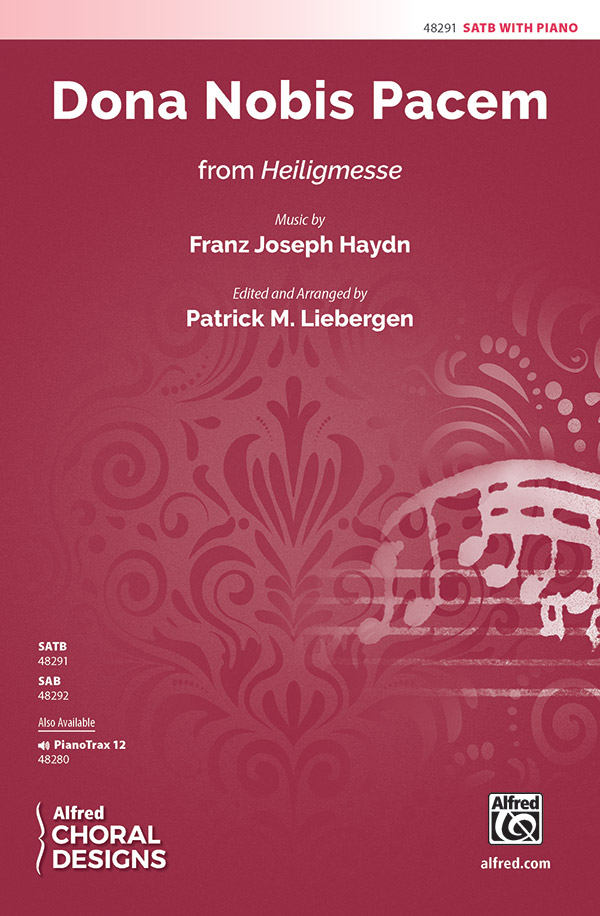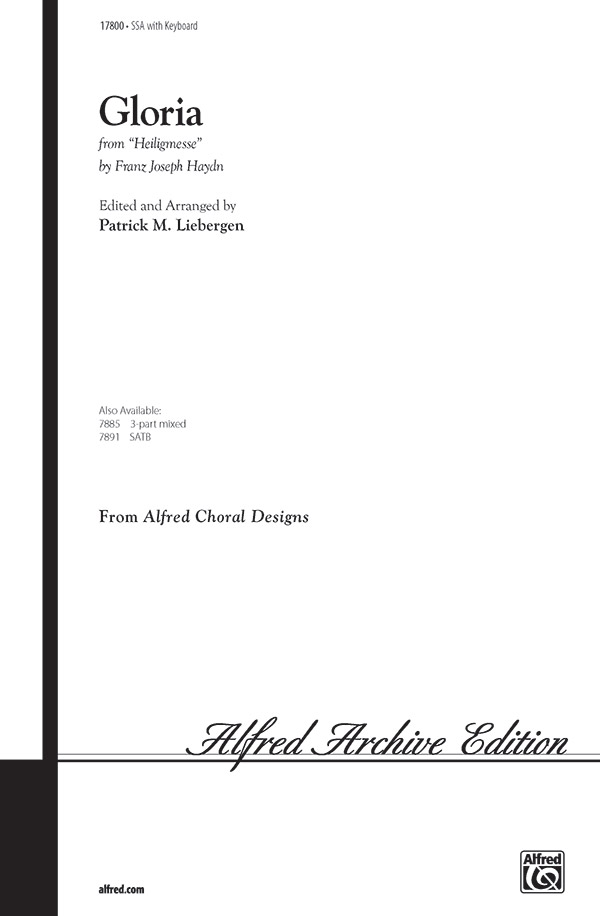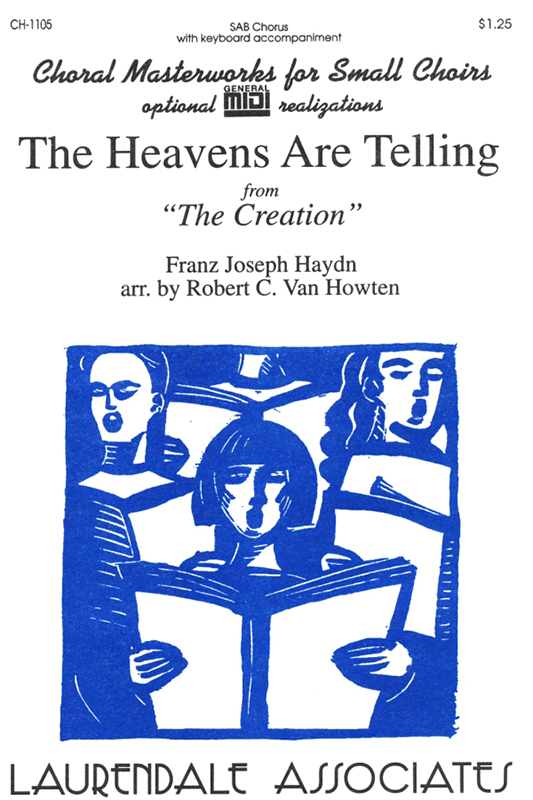In Celebration of the Human Voice - The Essential Musical Instrument
Home | Doo Wop | Barbershop | World | Contemporary | Christian | Vocal Jazz | Choral | Christmas | Instructional | Arrangements
Classical | Opera | Musicals | Personality | Young Singers | Disney | Videos | Songs | The Artists

Franz Joseph Haydn
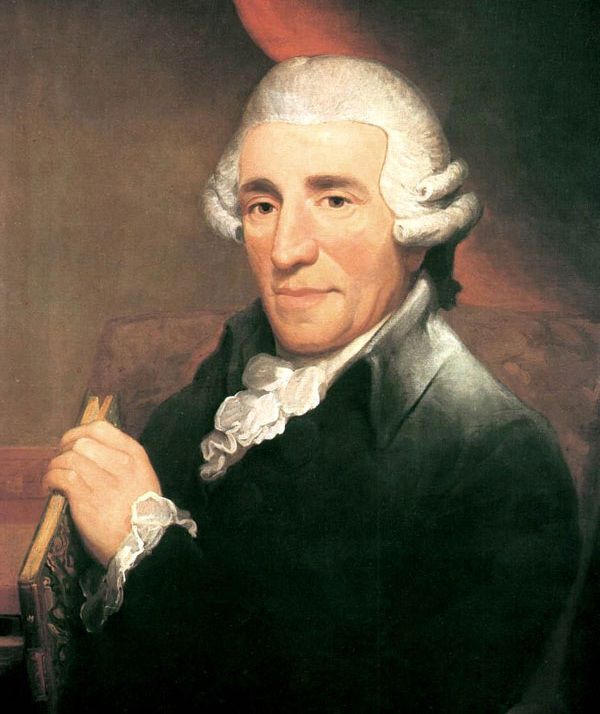
Franz Joseph Haydnwas an Austrian composer of the Classical period. He was instrumental in the development of chamber music such as the string quartet and piano trio. His contributions to musical form have led him to be called "Father of the Symphony" and "Father of the String Quartet". Haydn spent much of his career as a court musician for the wealthy Esterhazy family at their Eszterhaza Castle. Until the later part of his life, this isolated him from other composers and trends in music so that he was, as he put it, "forced to become original". Yet his music circulated widely, and for much of his career he was the most celebrated composer in Europe. He was a friend and mentor of Mozart, a tutor of Beethoven, and the older brother of composer Michael Haydn. |
Arrangements | Trax CDs
Songbooks, Arrangements and/or Media
Displaying 1-18 of 18 items.
Franz Joseph Haydn : Stabat Mater This thoughtful, delicate, dramatic and at times joyful Stabat Mater, is the vocal work that established Haydn throughout Europe as a great composer of religious music. Franz Joseph Haydn : 2 Duets for Soprano, Tenor and Piano Carlo Francesco Badini (1715-1810) worked for a long time as a librettist at London's Italian opera house. In 1791, he wrote the text to Joseph Haydn's last opera L'anima del filosofo, ossia Orfeo ed Euricice. In 1796 Badini collaborated once again with Haydn, resulting in two enchanting chamber duets for soprano, tenor and piano: Saper vorrei se m'ami and Guarda qui che lo vedrai, whose bucolic setting was very popular at the time. In this Henle Urtext edition, the detailed preface by the editor Marianne Helms offers information on the complex source situation and the publication of these duets. Franz Joseph Haydn : Third Mass (The Imperial of Lord Nelson) Latin/English. Songlist: Kyrie (Hear Our Pray'r) Haydn, Gloria (Glorious) Haydn, Qui Tollis (Lord Why Hast Thou) Haydn, Quoniam Tu Solus (Sing With Joy) Haydn, Credo (Lord Thou Hast) Haydn, Et Incarnatus (O Lord,Rebuke) Haydn, Et Resurrexit (Thou Hast Maintain'd) Haydn, Sanctus (Holy) Haydn, Benedictus (He Is Blessed) Haydn, Agnus Dei (Lord, We Pray) Haydn, Dona Nobis (Hallelujah,Amen) Haydn Franz Joseph Haydn : Seven Last Words of Christ English. Songlist: Father, forgive them (Haydn-7 Last Words), Verily, I say (Haydn-7 Last Words), Woman, behold (Haydn-7 Last Words), My God, my God! (Haydn-7 Last Words), I thirst (Haydn-7 Last Words), It is finished (Haydn-7 Last Words), Father, into Thy hands (Haydn-7 Last Words), He is no more (Haydn-7 Last Words) Franz Joseph Haydn : Mass in Time of War (Paukenmesse) Latin. Songlist: Kyrie (Haydn-Mass In Time Of War), Gloria (Haydn-Mass In Time Of War), Qui Tollis (Haydn-Mass In Time Of War), Quoniam Tu Solus (Haydn-Mass In Time Of War), Credo (Haydn-Mass In Time Of War), Et Incarnatus (Haydn-Mass In Time Of War), Sanctus (Haydn-Mass In Time Of War), Benedictus (Haydn-Mass In Time Of War), Agnus Dei (Haydn-Mass In Time Of War) Franz Joseph Haydn : Missa Solemnis in B-Flat (Harmoniemesse) Latin. Songlist: Kyrie (Haydn), Gloria In Excelsis (Haydn), Gratias Agimus (Haydn), Domine Deus (Haydn), Quoniam Tu Solus (Haydn), Credo In Unum (Haydn), Et Incarnatus Est (Haydn), Et Resurrexit (Haydn), Benedictus (Haydn), Agnus Dei (Haydn), Sanctus (Haydn) Franz Joseph Haydn : Mass in B-Flat (Schoepfungsmesse) Latin. Songlist: Kyrie (Haydn-Creation Mass), Gloria (Haydn-Creation Mass), Credo (Haydn-Creation Mass), Sanctus (Haydn-Creation Mass), Benedictus (Haydn-Creation Mass), Agnus Dei (Haydn-Creation Mass) Franz Joseph Haydn : Missa Sancti Nicolai This is probably the best of Haydn's early short masses, and certainly the most well-known. The Robbins Landon edition, based on the original performance materials, is now the standard, authoritative edition of this repertoire work. Franz Joseph Haydn : Missa Brevis in F Haydn's delightful Missa Brevis in F was both one of his earliest and latest works: he originally scored it for soloists, choir and strings, and returned to it at the end of his life to add wind parts. Either version may be performed using this new, authoritative edition, prepared by the Haydn scholar Denis McCaldin. Franz Joseph Haydn : Maria Theresa Mass Scored for Soprano, Alto, Tenor and Bass soli, SATB choir and orchestra. Haydn composed the Maria Theresa Mass in 1799, between the Creation and the Seasons. Revised edition by Michael Pilkington. Latin text. Franz Joseph Haydn : The Creation (Die Sch"opfung) Next to Handel's Messiah, The Creation is perhaps the most frequently performed oratorio. This edition is the first to present the English text as Haydn intended, without the modifications of twentieth-century editions, and is the version used by Haydn in his many public renditions of the work using large forces. The keyboard reduction in this edition is by the Leipzig Cantor A. E. Müller, termed 'the best (and) most idiomatic' by Haydn himself. Full details of sources and editorial method, as well as a bibliography, can be found in the full score. Franz Joseph Haydn : Te Deum for the Empress Marie Therese This setting of the Te Deum, dedicated to the wife of Franz I of Austria, is a rare example of a work from Haydn's late period that doesn't feature soloists. The second of Haydn's Te Deum settings, the work was performed in September 1800 on the name-day of the wife of Haydn's patron, Prince Nicolaus Esterhazy II, and it features the C major tonality and extensive use of trumpets and drums that were often associated with festive ceremony. Franz Joseph Haydn : Missa brevis Sancti Joannis de Deo ('Little Organ Mass') Haydn's Missa brevis Sancti Joannis de Deo dates from c.1775 and was written for the Order of the Brothers of Mercy based in Eisenstadt. The mass is known for its distinctive 'Benedictus', which features elaborate soprano writing and an extensive obbligato organ part from which the work's alternative title, 'Little Organ Mass', derives. This edition includes the elongated 'Gloria' composed by Haydn's younger brother Michael, with Haydn's 31-bar original included as an Appendix. Songlist: Kyrie, Gloria, Credo, Sanctus, Agnus Dei Franz Joseph Haydn : Missa in Tempore Belli (Mass in Time of War/Paukenmesse) Haydn's Missa in Tempore Belli was composed in 1796 for SATB chorus and soloists with orchestra. It is one of the finest of the six Hermenegild masses that, together with The Creation and The Seasons, represent the crowning glory of Haydn's final creative period. Although the work was originally written for relatively modest orchestral forces, the wind scoring was expanded when it was performed to great acclaim in Vienna in late 1796. This critical edition by Dr David Russell Hulme is the first to include both the original and Viennese scorings, and the vocal score contains a specially prepared piano reduction that provides a full and practical representation of the instrumental textures and clearly identifies the additional Viennese material. |
Displaying 1-25 of 25 items.
Haydn's The Creation is one of his larger works that is performed by choruses the world over. This chorus from The Creation will make a superb addition to any concert or festival performance. Earlene Rentz has retained the original integrity of the work while bringing it within the performance skills of most choirs.
Arranger: Earlene Rentz
Dr. Liebergen has skillfully edited this best-loved choral masterwork from one of Haydn's most popular oratorios. Without a doubt, this is the best engraved, easiest to read edition of this choral gem. Includes a full page Editor's Note, including historical and background information and performance suggestions. Features the original English text and a well crafted keyboard accompaniment. For contests, festivals, and adjudications.
Arranger: Patrick Liebergen
Now in a newly engraved edition, from Haydn's masterpiece oratorio The Creation, this famous chorus celebrates the third day, with a four-part fugue on the text For the heavens and earth/He has clothed in stately dress.
A re-imagining of a classical evergreen, this hymn of gratitude has the feeling of a processional. Reliable part-writing gives the anthem a traditional flair and maximizes the choral richness of any group. Appropriate anytime but especially useful at Thanksgiving. Score and Parts (fl 1-2, cl 1-2, timp, vn 1-2, va, vc, opt. db) available as a digital download.
Arranger: Jon Paige
For those looking for a distinguished selection by Franz Joseph Haydn (1732-1809), this last movement in the "St. Nicholas Mass" is the perfect choice for choirs with accomplished soloists. It features prominently the solo quartet with the chorus giving the responses. A choice out of the ordinary for a good high school choir and beyond.
Arranger: Philip Brunelle
Taken from Haydn's masterwork Heiligmesse, this shortened edition has also been transposed to make it more accessible. The setting of the compact Latin text explores many of the conventions of the Classical period, including energized homophonic choral lines, structured musical form, and stark dynamic contrasts.
This section of the joyous movement from Haydn's masterwork has been carefully crafted in an accessible setting for middle school or early high school voices. It is well suited for concert and festival, as well as church choirs. Duration: ca. 3:15.
Arranger: Russell L. Robinson
This particular edition is a pleasure to sing and the skillful contemporary edition makes it easy to read. And, with the new SSA edition, treble voice choirs can also perform this eighteenth century masterpiece.
Arranger: Patrick Liebergen
When Leonard Bernstein wanted to cleanse his pallet, he studied Haydn. This chorus from Haydn's Heiligmesse is an ideal introduction to classical style and a wonderful vehicle for you as the director to work on tone and line and all of the elements of good singing that you strive for.
Accessible voice parts shine in with this Latin text of the Haydn Gloria. It's suitable for concert, contest or festival use with optional solo opportunities. History included on Lord Nelson and Napoleon for additional teaching purposes.
Arranger: Russell Robinson
From Haydn's Harmoniemesse comes this new arrangement of the Dona Nobis Pacem. Published with both Latin and English words, this is an excellent piece for the concert or church.
Arranger: Walter Ehret
Motet for SATB Choir and Organ. Accompaniment arranged by Joseph Barnby.
The enduring classic Oratorio for SATB chorus and STB soli. This vocal score, edited and arranged by Michael Pilkington, contains a piano/organ accompaniment and English/German text.
Here is the jubilant movement from Haydn's The Creation newly engraved in print and digital editions and with part-predominant rehearsal tracks. Available separately: SATB, VoiceTrax CD. Duration: ca. 4:25.
This triumphal chorus from the oratorio, The Creation, received its first public performance in Vienna in 1779. Texts are taken from Genesis and from Milton's epic poem, Paradise Lost. This was the first piece published with both German and English as original texts. Original English text was translated into German for Haydn to set (he felt uncomfortable with setting English) to music. The English text was subsequently added and thus was first released with both texts underlaid. Optional MIDI file available separately (on MIDI disk LMF-1001)
Duration 2:04
Edited with a new English translation by Michael Pilkington. The English translation in this edition is entirely new, and attempts to provide a translation of van Swieten's text that fits Haydn's music. The style used tries to give some flavour of eighteenth-century language while being easily intelligible today, being an eighteenth century work. Arranged for soprano, tenor and bass soloists, SATB and orchestra. English/German edition.
![]() Vocal Harmony Arrangements - Home
Vocal Harmony Arrangements - Home
Christian | Gospel | Standards | Musicals | Specialty | World | Barbershop | Contemporary | Vocal Jazz | Choral | Christmas
Mixed Voices | Female | Male | 8 Parts | 6 Parts | 5 Parts | 3 Parts | 2 Parts | Medleys | Solo | Folio Series | New Releases
Select a Category |
Want to Sing? - Find a Chorus Near You
List of Choruses by State | List of Choruses by City

